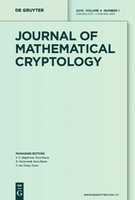
Journal of Mathematical Cryptology
metrics 2024
Advancing Knowledge in Cryptography with Cutting-Edge Research
Introduction
The Journal of Mathematical Cryptology, published by DE GRUYTER POLAND SP Z O O, is a pioneering open-access journal that has been a valuable resource for researchers and professionals in the field of mathematical cryptography since its inception in 2007. With an ISSN of 1862-2976 and an E-ISSN of 1862-2984, this journal provides a platform for cutting-edge research, aiming to address the complexities and challenges presented by the evolving landscape of cybersecurity. As of 2023, the journal holds a respectable Q3 ranking in Applied Mathematics, Computational Mathematics, and Computer Science Applications, reflecting its relevance and growing impact within these disciplines. Although it currently has an H-index of "-", the qualitative contributions of the journal are recognized through its Scopus rankings, including a placement in the 58th percentile for Applied Mathematics. The journal is committed to fostering collaboration and innovation in mathematical methodologies applied to cryptography, thus attracting a diverse audience of researchers, students, and industry professionals. By embracing an open-access model since 2020, the Journal of Mathematical Cryptology enhances the visibility and accessibility of essential research findings, making it a crucial resource in the academic community.
Metrics 2024
 0.27
0.27 0.50
0.50 0.70
0.70 19
19Metrics History
Rank 2024
Scopus
IF (Web Of Science)
JCI (Web Of Science)
Quartile History
Similar Journals

Quantum Studies-Mathematics and Foundations
Advancing the frontiers of quantum mathematics.Quantum Studies-Mathematics and Foundations, published by SPRINGER, is an esteemed academic journal dedicated to advancing the field of quantum theories by providing a platform for the intersection of mathematics, physics, and foundational principles. Established in 2014, the journal has garnered a respectable impact factor within the academic community, reflective of its commitment to quality research, acknowledged in its Q3 ranking in both Atomic and Molecular Physics and Mathematical Physics for 2023. With a focus on groundbreaking studies that explore the subtleties of quantum mechanics and its mathematical underpinnings, the journal aims to foster innovative research and contribute to the discourse among researchers, professionals, and students alike. Although the journal operates on a non-open access model, it provides invaluable insights that bridge theoretical frameworks with practical applications in the quantum realm. The journal is located in a prime academic hub in Switzerland, making it a significant contributor to the global dialogue in physics and mathematics.

LETTERS IN MATHEMATICAL PHYSICS
Cultivating excellence in research and scholarship since 1975.LETTERS IN MATHEMATICAL PHYSICS, published by Springer, stands as a pivotal platform in the realm of mathematical and statistical physics. With a commitment to disseminating innovative research findings since its inception in 1975, this journal serves both established and emerging scholars by fostering a multidisciplinary dialogue that is vital for the advancement of theoretical concepts and practical applications. The journal boasts an impressive Q1 ranking in both Mathematical Physics and Statistical and Nonlinear Physics categories as of 2023, reflecting its significant impact in these fields, supported by a strong Scopus ranking of 36th and 37th in respective categories. Although it operates on a traditional access model, the journal’s convergence until 2024 ensures a rich repository of literature that aids researchers, professionals, and students in navigating the complexities of mathematical physics. With its strategic location in the Netherlands, LETTERS IN MATHEMATICAL PHYSICS is poised to continue its tradition of excellence, encouraging contributions that deepen the understanding of mathematical frameworks underlying physical phenomena.

COLLOQUIUM MATHEMATICUM
Bridging theory and practice in the mathematical community.COLLOQUIUM MATHEMATICUM, published by ARS POLONA-RUCH, serves as an essential platform for the dissemination of innovative research in the field of mathematics. With an ISSN of 0010-1354 and a dedicated E-ISSN of 1730-6302, this journal plays a crucial role in advancing mathematical knowledge and fostering collaboration within the academic community. Although it is categorized in the Q3 quartile for miscellaneous mathematics, its content consistently attracts a diverse readership, reflecting a wide array of mathematical disciplines. Spanning publication years from 2001 to 2009 and resuming from 2011 to the present, *COLLOQUIUM MATHEMATICUM* offers researchers, professionals, and students the unique opportunity to engage with groundbreaking concepts and methodologies. With its home base in Warsaw, Poland, this journal not only contributes to the regional mathematical landscape but also impacts the broader global community. While currently not adopting an open access model, the journal remains committed to quality research, evidenced by its Scopus ranking within the general mathematics category. Engage with *COLLOQUIUM MATHEMATICUM* to be at the forefront of mathematical exploration.
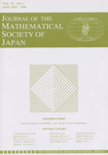
JOURNAL OF THE MATHEMATICAL SOCIETY OF JAPAN
Championing Original Research in the Mathematical CommunityJournal of the Mathematical Society of Japan, established in 1948, is a premier scholarly journal dedicated to advancing mathematical research and discourse. Published by the esteemed Mathematical Society of Japan, this journal has consistently achieved recognition for its rigorous and innovative contributions to the field, achieving a prestigious Q1 category ranking in miscellaneous mathematics as of 2023. Although it maintains a subscription-based access model, the journal remains an invaluable resource for researchers, professionals, and students alike, fostering a deeper understanding and exploration of mathematics across various disciplines. With a focus on disseminating high-quality original research, reviews, and comprehensive articles, the Journal of the Mathematical Society of Japan plays a crucial role in the global mathematical community and continues to influence new generations of mathematicians through its commitment to excellence.
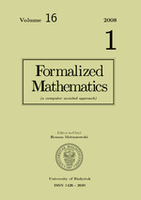
Formalized Mathematics
Innovating Through Open Access to Mathematical InsightsFormalized Mathematics is a pioneering open-access journal published by SCIENDO, dedicated to the field of formalized systems and mathematical foundations. Since its inception in 2006, it has provided a platform for researchers to discuss and disseminate advancements in applied mathematics and computational mathematics, emphasizing formalization in mathematical reasoning. Although recent coverage in Scopus has been discontinued, the journal still serves as a valuable resource for academics looking to deepen their understanding of formalized approaches to mathematical problems. With its ISSN 1898-9934, the journal not only promotes unrestricted access to quality research but also facilitates collaboration among mathematicians and computer scientists. Given its rankings—20th percentile in Applied Mathematics and 18th percentile in Computational Mathematics—Formalized Mathematics is a vital conduit for innovative research, making it a significant asset for students, professionals, and scholars aiming to explore the intersection of mathematics and formal logic.
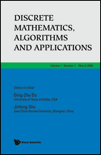
Discrete Mathematics Algorithms and Applications
Advancing the Frontiers of Discrete Mathematics.Discrete Mathematics Algorithms and Applications, published by World Scientific Publishing Co Pte Ltd, stands as a pivotal resource in the field of discrete mathematics and combinatorics since its inception in 2009, with a convergence period extending to 2024. The journal holds an esteemed position within its category, ranked in the Q3 quartile according to latest metrics, recognized for its qualitative contributions to the academic community. With an ISSN of 1793-8309 and an E-ISSN of 1793-8317, it serves as a vital conduit for disseminating innovative research focused on algorithms and their applications within discrete mathematics. Although currently not an open access journal, it provides access to valuable insights and findings that are crucial for researchers, professionals, and students seeking to advance their understanding and application of discrete mathematical concepts. Based in Singapore, the journal continues to promote rigorous scholarly discourse and is a key publication for those involved in advancing the discipline.

Prikladnaya Diskretnaya Matematika
Connecting Scholars with Cutting-Edge Computational Insights.Prikladnaya Diskretnaya Matematika, published by the PUBLISHING HOUSE SCIENTIFIC & TECHNICAL LITERATURE in the Russian Federation, serves as a vital resource for scholars and practitioners in the realms of applied mathematics, computational theory, and discrete mathematics. With an ISSN of 2071-0410 and an E-ISSN of 2311-2263, this journal has been actively contributing to the academic discourse since its inception in 2016, with expectations to continue until at least 2024. Although currently positioned in the Q4 category across several disciplines—including applied mathematics, computational theory, and signal processing—this journal offers a unique opportunity for researchers to contribute to an evolving field, despite facing competitive rankings in the Scopus database. The open access nature of the journal reflects a commitment to disseminating knowledge broadly, albeit details regarding access options remain unspecified. As a publication dedicated to fostering innovation and collaboration in theoretical and practical applications, Prikladnaya Diskretnaya Matematika plays an important role in advancing mathematical theories and practices, making it pertinent for those engaged in research and application within these critical domains.
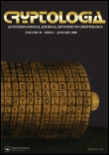
CRYPTOLOGIA
Exploring the Art and Science of CryptographyCRYPTOLOGIA, published by Taylor & Francis Inc, is a pivotal journal dedicated to the field of cryptography and its applications. With an ISSN of 0161-1194 and an E-ISSN of 1558-1586, this journal has been a significant platform since its inception in 1977, promoting rigorous peer-reviewed research for scholars and practitioners alike. Although the journal's coverage was discontinued in Scopus after 2018, its legacy continues through a devoted readership, and it remains influential in the domains of Computer Science and Applied Mathematics, as indicating by its Scopus rankings. CRYPTOLOGIA presents a crucial repository of knowledge for those engaged in the evolving challenges of secure communication and information integrity. Researchers, professionals, and students interested in cryptographic protocols and theory can find invaluable insights and advancements within its pages, all while benefiting from the quality assurance of a reputable publisher.

International Journal of Computer Mathematics- Computer Systems Theory
Shaping the Future of Computational MathematicsInternational Journal of Computer Mathematics - Computer Systems Theory, published by Taylor & Francis Ltd, is a vital resource in the fields of computational mathematics and computer systems theory. With an ISSN of 2379-9927 and E-ISSN 2379-9935, this journal has established a prominent presence in academia since its inception in 2016. It is categorized in the Q3 quartile for both Computational Mathematics and Computational Theory in 2023, reflecting its impact and contribution to the scholarly discourse within these domains. The journal’s Scopus rankings further emphasize its academic relevance, placing it in the 38th and 33rd percentiles in their respective categories. International Journal of Computer Mathematics aims to disseminate innovative research findings, methodologies, and theoretical advancements, making it an essential publication for researchers, professionals, and students looking to deepen their understanding of computational methods and applications. Although it currently does not offer open access, the journal continues to provide insightful contributions to the scientific community, fostering the evolution of computational sciences.

Rad Hrvatske Akademije Znanosti i Umjetnosti-Matematicke Znanosti
Unveiling Insights in the World of MathematicsRad Hrvatske Akademije Znanosti i Umjetnosti-Matematicke Znanosti is a distinguished journal published by the Croatian Academy of Sciences and Arts, focusing on the vast domain of mathematics and its multifaceted applications. Established in Croatia, this journal serves as a vital platform for scholars and practitioners to disseminate innovative and significant research findings in mathematical science. With an ISSN of 1849-2215, it has been indexed in Scopus, achieving a notable Q3 ranking in the miscellaneous category of mathematics, which reflects its influence and reach within the academic community. While currently not classified as an open-access journal, it endeavors to offer accessible insights and foster collaboration among researchers, professionals, and students. Published annually, it spans diverse topics critical to advancing mathematical understanding and promotes the exchange of ideas across international boundaries. Emphasizing quality, this journal contributes to the ongoing dialogue in the mathematical sciences, thereby strengthening academic ties and enhancing knowledge dissemination.